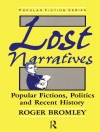New essays on the influence of politics on 20c. German culture, not only during the Nazi and Cold War eras but in periods when the effects are less obvious.
The cultural history of 20th-century Germany, more perhaps than that of any other European country, was decisively influenced by political forces and developments. This volume of essays focuses on the relationship between German politics and culture, which is most obvious in the case of the Third Reich and the German Democratic Republic, where the one-party control of all areas of life was extended to the arts; these were expected to conform to the idealsof the day. But the relationship between politics and the arts has not always been one purely of coercion, censorship, collusion, and opportunism. Many writers greeted the First World War with quite voluntary enthusiasm; others conjured up the National Socialist revolution in intense Expressionist images long before 1933. The GDR was heralded by writers returning from Nazi exile as the anti-fascist answer to the Third Reich. And in West Germany, politicsdid not dictate artistic norms, nor was it greeted with any great enthusiasm among intellectuals, but writers did tend to ally themselves with particular parties. To an extent, the pre-1990 literary establishment in the Federal Republic was dominated by a left-liberal consensus that German division was the just punishment for Auschwitz. United Germany began its existence with a fierce literary debate in 1990-92, with leading literary critics arguing that East and West German literature had basically shored up the political order in the two countries. Now a new literature was required, one that was free of ideology, intensely subjective and experimental in its aesthetic. In 1998, the author Martin Walser called for an end to the author’s role as ‘conscience of the nation’ and for the right to subjective experience. This is the first book to examine this crucial relationship between politics and culture in Germany.
William Niven and James Jordan are readers in German at the University of Nottingham Trent.
قائمة المحتويات
Introduction – William Niven
From Nature to Modernism: The Concept and Discourse of Culture in Its Development from the Nineteenth into the Twentieth Century Twentieth Century – Fritz Wefelmeyer
The German ‘Geist und Macht’ Dichotomy: Just a Game of Red Indians? –
‘In the Exile of Internment’ or ‘Von Versuchen, aus einer Not eine Tugend zu machen’: German-speaking Women Interned by the British During the Second World Warby the British During the Second World War – Charmian Brinson
‘Deutschland lebt an der Nahtstelle, an der Bruchstelle’: Literature and Politics in Germany 1933-1950 – David Basker
‘Das habe ich getan, sagt mein Gedächtnis. Das
kann ich nicht getan haben, sagt mein Stolz!…’ History and Morality in Hochhuth’s
Effis Nachtin Hochhuth’s
Effis Nacht – Hans-Joachim Hahn
Stefan Heym and GDR Cultural Politics – Reinhard Zachau
Reviving the Dead: Montage and Temporal Dislocation in Karls Enkel’s
Liedertheater – David G. Robb
Living Without Utopia: Four Women Writers’ Responses to the Demise of the GDR – Gisela Shaw
A Worm’s Eye View and a Bird’s Eye View: Culture and Politics in Berlin since 1989 – Ulrike Zitzlsperger
Remembering for the Future, Engaging with the Present: National Memory Management and the Dialectic of Normality in the Berlin Republicin the Berlin Republic – Caroline Gay
‘Wie kannst due mich lieben?’: ‘Normalizing’ the Relationship between Germans and Jews in the 1990s Films
Aimée und Jaguar and
MeschuggeJaguar and
Meschugge – Stuart Taberner
Models of the Intellectual in Contemporary France and Germany: Silence and Communication – John Marks
عن المؤلف
BILL NIVEN is Professor Emeritus of History at Nottingham Trent University, UK












